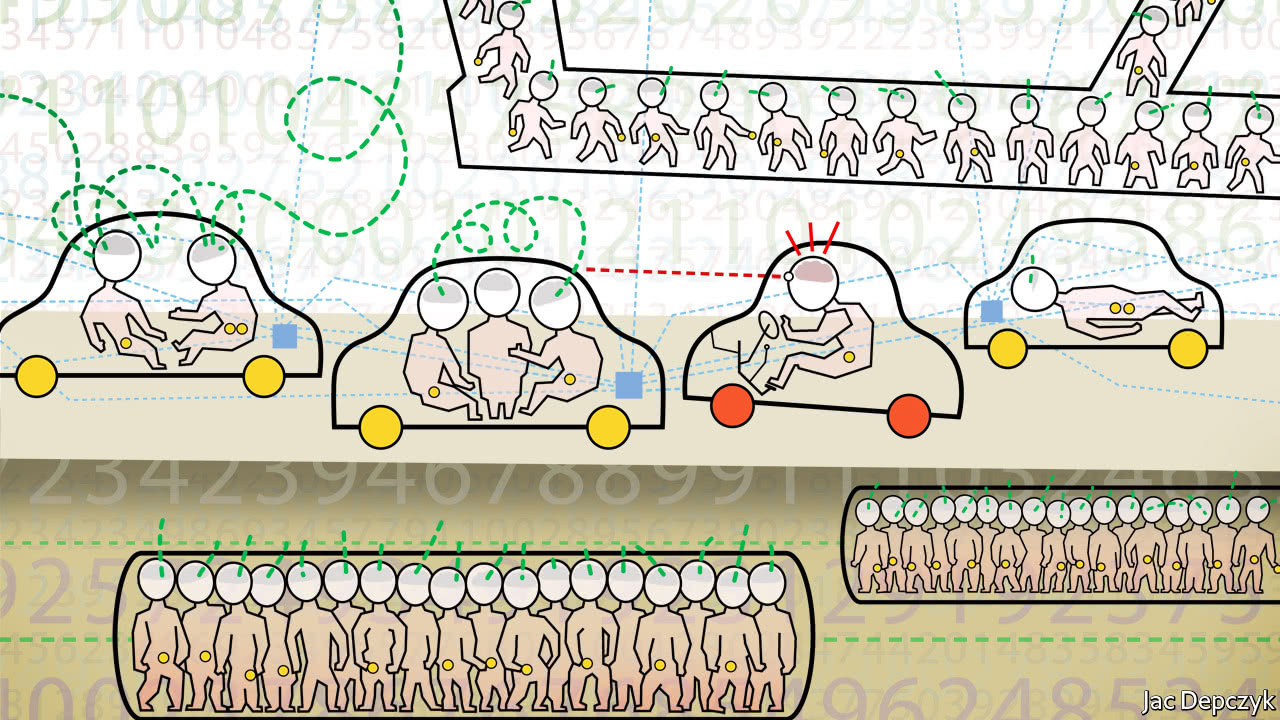
THE most distractingly unrealistic feature of most science fiction—by some margin—is how the great soaring cities of the future never seem to struggle with traffic. Whatever dystopias lie ahead, futurists seem confident we can sort out congestion. If hope that technology will fix traffic springs eternal, history suggests something different. Transport innovation, from railways to cars, reshaped cities and drove economic advance. But it also brought crowded commutes. Now, as tech firms and carmakers aim to roll out fleets of driverless cars, it is worth asking: might this time be different? Alas, artificial intelligence (AI) is unlikely to succeed where steel rails and internal-combustion engines failed.
More’s the pity. In America alone, traffic congestion brings economic losses estimated in the hundreds of billions of dollars each year. Such costs will rise unless existing transport systems receive badly needed investment. For example, fixing New York’s beleaguered, overcrowded subway will take at least $100bn, according to one recent estimate. A driverless deus ex machina might seem to spare governments some difficult decisions.
But congestion is a near-inevitable side-effect of urban growth. Cities exist because being near to other people brings enormous advantages. Proximity allows people to find friends, mates and business partners, to discuss ideas and generate new ones, and to trade (and so to capture the benefits of specialisation). Regrettably, clumping leads to crowding: the more people an area houses, the greater the competition for its scarce resources, from seats at a hot new restaurant to space on public roadways. Each new arrival enhances a city’s magic but also adds to congestion. Cities grow until costs outstrip benefits.
New transport technologies are not useless. Mass-transit railways and highways allowed big cities to get bigger. But their congestion-easing benefits inevitably proved temporary. When the New York subway extended into northern Manhattan, it became practical to live far from the dirty, expensive, crowded downtown area, while still enjoying access to the city’s social and economic benefits. So the city’s population rose—a lot—leaving New Yorkers once more cheek by jowl. A post-war highway-building boom in America yielded explosive growth in city suburbs. Cities once again found their equilibrium, however, as the suburban land-rush led to road congestion, raising the cost of living far from employment centres. In a paper published in 2011, Gilles Duranton, of the University of Pennsylvania, and Matthew Turner, of Brown University, identified a “fundamental law of road congestion”: namely, that building more highways does not alleviate congestion. Rather, it attracts more residents, leads to more driving by existing residents and boosts transport-intensive economic activity, until roads are once again crammed.
Driverless cars should cut traffic, other things being equal. Lower accident rates will mean fewer crash-related hold-ups, while AIs that can pilot cars more closely together will boost road capacity. But reductions in traffic will make living in currently congested areas more attractive and hence more populous. Miles travelled per person might also rise, since self-driving technology frees passengers to use travel time for work or sleep. And just as new highways prompt a rise in transport-intensive business, driverless vehicles could generate lots of new road-using activity. Where now a worker might pop into the coffee shop before going to work, for example, a latte might soon be delivered in a driverless vehicle. The technology of driverless cars may make us safer and more productive, but not necessarily less traffic-bound.
It might, however, improve traffic by making it easier, politically, to impose tolls on roads. Jams occur because a scarce resource, the road, is underpriced, so more people drive than it can accommodate. But tolls could favour use of the roadway by those who value it most. Some places already use such charges—London and Singapore are examples—but they are rarely popular. Some drivers balk at paying for what they once got for nothing, and others are uneasy about the tracking of private vehicles that efficient pricing requires. People seem not to object to paying by the mile when they are being driven—by taxis and services like Uber and Lyft—and the driverless programmes now being tested by Waymo and GM follow this model. If a driverless world is one in which people generally buy rides rather than cars, then not only might fewer unnecessary journeys be made, but also political resistance to road-pricing could ease, and congestion with it.
Ok, commuter
That might lead to a different kind of dystopia (also with historical antecedents): one in which fast, functional transport is available only to those who can pay. Luckily, history also suggests a solution: mass transit. Ride-hailing services might introduce multi-passenger vehicles and split travel costs across riders (they could call them “buses”). Or, as Daniel Rauch and David Schleicher of Yale University argue, governments might instead co-opt the new transport ecosystem for their own purposes. They might subsidise the travel of low-income workers, or take over such systems entirely (a common fate for mass-transit systems which begin life as private enterprises, including the New York subway). Municipal networks of driverless cars might prove less efficient than private ones, particularly if cars are rationed on a first-come-first-served basis rather than by price. But in the past city governments have felt that providing equal-opportunity access to centres of economic activity was worth the cost.
Should congestion prove ineradicable in a driverless world, people will continue to hope for technological solutions, like the long-promised flying cars. While we wait for that—and the clotted skyways that would soon follow—governments would be wise to keep their underground systems in good working order.
Source: economist
Why driverless cars may mean jams tomorrow